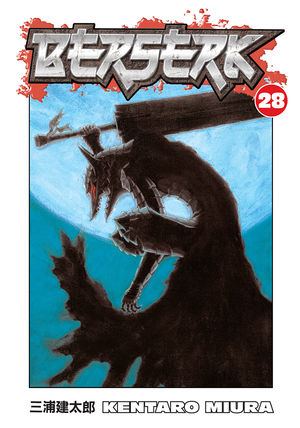
Berserk 28 brings Guts face to face with the Skull Knight again. The readers at this point know a little more than Guts does at who or what the Skull Knight is. This mysteriousness allows Kentaro to use the Skull Knight in various ways and while Guts thanks him at this point, he, much like the reader, doesnt' know what the Skull Knight's end game is.
Here, the Skull Knight warns Guts that continuing to wear the armor will continue to have greater and greater consequences. "Color fades from the eyes, the tongue loses teaste, shivering plagues the fingertips... Each time you wear that armor and fight as the berserk, light, voice, warmth, you will come to lose many things."
And the ole Skull Knight knows all of this because he once wore the armor. Still in his role as Guide, the Skull Knight informs Guts that there will be apostles soon and they may be lead by Griffith but Guts will be unable to take the fight to Griffith if he wants to heal Casca, whose still insane after her ordeal many volumes ago.
This is where the title of the column comes from this time. The Skull Knight notes that to protect or to contend comes from. Guts can either follow his heart's desire to fight Griffith or to fight that desire and do what many would consider the right thing and protect Casca. But it's even more as Guts learns that it's not just protection, but if he gets her to Puck's elf land home, she can be cured of her insanity. But that may not be all that Guts wants as if cured, her desire may not be the same as his own...
Here, one of the character's own background as a herald of arms comes into his own as the group enters Vritannis, a leading trade city, Serpico throws down some quick information on no less than five different countries troops that all have the Holy See in their lands. The Holy See would most resemble some fantasy version of Christianity with the religion being in several different countries, all of whom might not always be on friendly terms, but when invaded by an outside force with an outside religion, are capable of pulling together.
Guts on the other hand, acts as a guide as to how mercenaries gather their troops. By having the leader make a direct 'sales pitch', the mercenaries get to see what shape the leader is in. Guts throws out the following observations.
Does he look dependable?
Does he look wealthy?
Does he get on well with the soldiers?
"Mercenaries aren't patriots or chapions of some great cause. It's all about earning enough to eat. Strength is the rule for a mercenary band, but first you gotta see if the boss if on your side or the employer's."
Here the book stumbles a little. Some recall Griffith, but no one recalls Guts, the captain of the Raider's? Even more ironic is Isidro being inspired by Gut's hundred man kill, but not knowing Guts name. It's a little flub in that it seems everyone would know but if pressed, it's understandable. Years have passed, Guts was never seen enjoying the limelight but rather enjoying training, and the kingdom in which he earned his nick name is in shambles.
The book also showcases a few things in brief. The spirits of the dead, invisible to all those who are used to the hustle and bustle of city live, are trapped here. Condemed because they were slaves of the wrong race when war broke out, their spirits linger.
Next, it showcases that despite having magic laws, that there is not just one way for magic to work. Schierke encounters Sonia who is able to sense things like souls, the strange nature of the apostles, and other things that border on well, psychic as opposed to magic.
This works well in a role playing game environment. For example, the old Rolemaster was traditionally broken into three methods of magic;
Channelling: Taking divine energy and well, channelling it through you.
Psychic: Magic based psionics.
Essence: Essentially gathering the flow of energy, much like the force, and turning it into say, Lightning Bolts.
As the game line expanded, there were other bits.
Psionic: Taken straight out of good old Space Master.
Elementalism: Energy from the elemental realms.
Arcane: Prior to the split of magic into the three original forms, magic was more raw, perhaps more powerful, and perhaps more difficult to use.
In other words, if it can fit into the campaign and isn't overbalancing, why not say yes? Different methods of magic can work great in making one culture different from another just as spell selection within a magic school can work to make one branch of study different than another.
Keep the options open and allow the players to have multiple paths but don't be afraid to remind them that they may not be able to master all the paths they seek to.





No comments:
Post a Comment